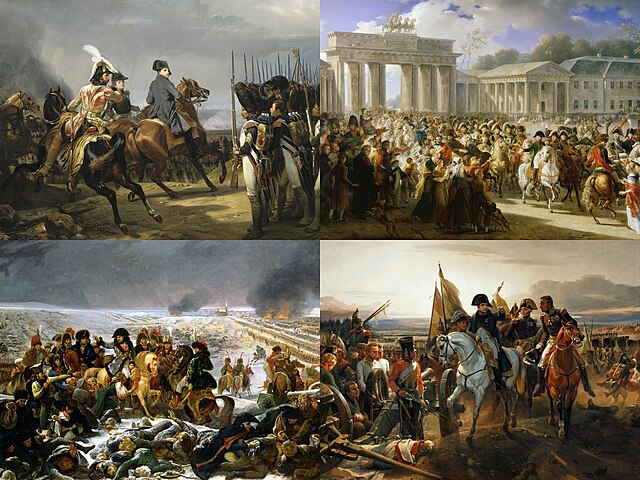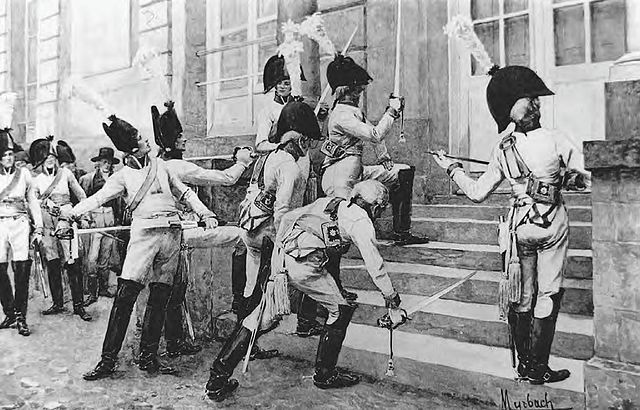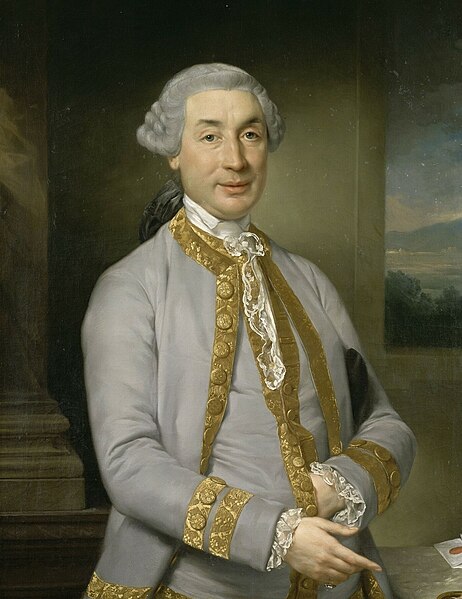War of the Fourth Coalition
The War of the Fourth Coalition was a war spanning 1806–1807 that saw a multinational coalition fight against Napoleon's French Empire, subsequently being defeated. The main coalition partners were Prussia and Russia with Saxony, Sweden, and Great Britain also contributing. Excluding Prussia, some members of the coalition had previously been fighting France as part of the Third Coalition, and there was no intervening period of general peace. On 9 October 1806, Prussia declared war on France and joined a renewed coalition, fearing the rise in French power after the defeat of Austria and establishment of the French-sponsored Confederation of the Rhine in addition to having learned of French plans to cede Prussian-desired Hanover to Britain in exchange for peace. Prussia and Russia mobilized for a fresh campaign with France, massing troops in Saxony.
War of the Fourth Coalition
Officers of the élite Prussian Gardes du Corps, wishing to provoke war, ostentatiously sharpen their swords on the steps of the French embassy in Berlin in the autumn of 1806
Queen Louise
Aftermath of the Battle of Eylau
Napoleon Bonaparte, later known by his regnal name Napoleon I, was a French emperor and military commander who rose to prominence during the French Revolution and led successful campaigns during the Revolutionary Wars. He was the leader of the French Republic as First Consul from 1799 to 1804, then of the French Empire as Emperor of the French from 1804 until 1814, and briefly again in 1815. His political and cultural legacy endures as a celebrated and controversial leader. He is considered one of the greatest military commanders in history and his wars and campaigns are still studied at military schools worldwide. However, historians still debate the degree to which he was responsible for the Napoleonic Wars, in which between three and six million people died. Napoleon brought modernizing reforms to France and Western Europe and stimulating the development of nation states. He also sold the Louisiana Territory to the United States in 1803, doubling the latter's size. However, his mixed record on civil rights and exploitation of conquered territories adversely affect his reputation.

The Emperor Napoleon in His Study at the Tuileries, 1812
Napoleon's father, Carlo Buonaparte, fought for Corsican independence under Pasquale Paoli. After their defeat, he eventually became the island's representative to Louis XVI's court.
Statue of Bonaparte as a schoolboy in Brienne, aged 15, by Louis Rochet [fr] (1853)
Bonaparte, aged 23, as lieutenant-colonel of a battalion of Corsican Republican volunteers. Portrait made in 1835 by Henri Félix Emmanuel Philippoteaux







![Statue of Bonaparte as a schoolboy in Brienne, aged 15, by Louis Rochet [fr] (1853)](https://upload.wikimedia.org/wikipedia/commons/thumb/3/3d/Bonaparte_%C3%A9colier_IMG_6712.jpg/600px-Bonaparte_%C3%A9colier_IMG_6712.jpg)
